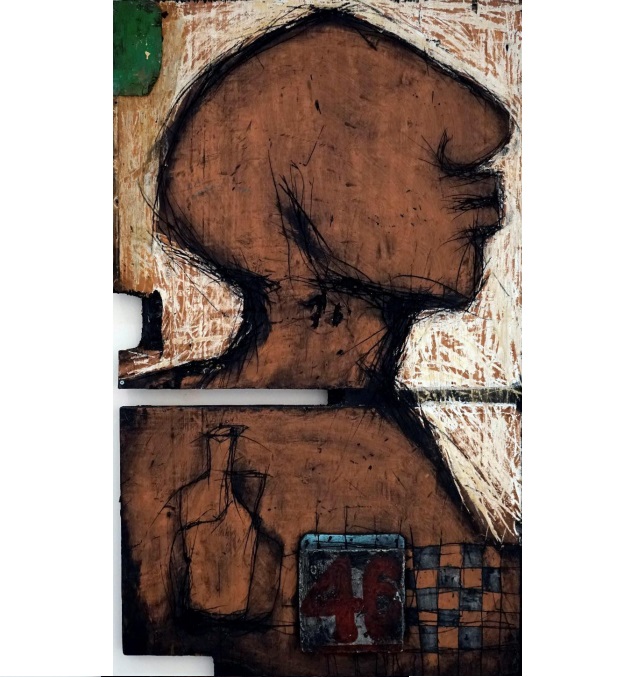
Exhibit says more than reunion of friendship and family post- Covid-19 pandemic
Kampala, Uganda | DOMINIC MUWANGUZI | What one makes of Eltayeb’s astonishing portraits on scratched surfaces is that they seem to communicate a message about the artist. Rightly, the iconic series he aptly refers to as Spirit of faces,are evocative of the artist’s past and present: the people he has encountered from his childhood days in Sudan and to the present. Yet they are not ordinary portraits suggesting the people he has met, but metaphors of memories carried forward when such meetings take place. The idea to scrape these faces on worn out wooden tablets like cabinet doors or window panels suggest the similarity between established human relationships and objects preserved from previous habitats.To the artist, these are not merely relics but medium that posses the spirit and secrets of the former environment they inhabited. Hence, the technique to appropriate their identity in a series that interrogate the subject of memory and nature of human relationships in a world that is fast becoming globalize.
Eltayeb Dawelbait, by nature is a free spirited fellow who loves life and is attracted to its vitality. He therefore is friendly and enjoys a good laugh from time to time. He is also a good chef of Sudanese cuisine dishes something that easily endears him to those who pay him a visit to his studio in Nairobi. If food is the right ingredient to create memorable friendships, then Eltayeb got it right. Like the skilled chef he is, his palette- often of non contrasting colours- evoke the idea crude emotions in his paintings. This is complemented by the free- hand scratches on the tired surface and the preservation of wooden panels in their derelict form: often visibly bearing traits of their former life. This unrefined quality is a representation of the intense emotions harboured in the artwork.
The subject matter of emotions is not unique to Eltayeb’s artworks, but can be traced in the art of his three counterparts: Salah Elmur, Hussein Halfawi and Abushariaa Ahmed; who share with him the same space in a group exhibition “Rendezvous” at Afriart. Salah Elmur’s paintings bare nolstagic feelings about Sudan’s social landscape and are inspired by the photographs of his family and photographic archives of the places he has visited in the past and present. While he employs vivid colours to create strong contrasts on canvas, unlike Eltayeb and Abushariaa, his distortion of natural figures and proportionality give his compositions a particular depth symbolic to the emotions he confesses. As such, one painting (Golden Jubilee, 2020)is a portrait of three distorted human figures deliberately arranged in a typical studio fashion of the 1950s,60s and 70s. Such portraits revealed so much about the identity and emotions of the subjects and undoubtedly were used on postcards and magazine covers.
While the four artists create a visual narrative of Sudan’s multicultural landscape through their graphical paintings, their reuniting in Kampala for a group show has a contemporary relevance. In these times of the pandemic when movement is slowly easing, the show becomes a symbol of reunion of family and friends. The artists who met for the first time at the Khartoum School of Fine Art and later moved to Nairobi as political exilees, after more than two decades plan and select Kampala as a place of a Rendezvous in form of an exhibition. Suffice to say, in their work the artists subtly tackle the subject of human relationships and how it is vital in our everyday dealings. Ahmed Abushariaa series on the Sudan Revolution justify such interrogation when groups of women unite for a common agenda to overturn the cultural stigma attached to women in Sudan. Their united resolve inspired by a friendship built out of necessity is strong enough to overthrow a government.
Rendezvous is not simply a show that pays homage to four Sudanese artists meeting in Kampala, but one that carries several interpretations like a special meeting of friends that inspire lingering memories forever. Here, beyond the metaphorical meaning to reawaken the interrupted relationship among friends and family, the exhibit is provocation to artists to form meaningful relationships amongst themselves. This is to create solid ground for their work that cannot be shaken by cultural or territorial boundaries. Conversely, the exhibit is a gesture to the international outlook the gallery has undertaken to link local and regional artists to wider global art audiences.
****
The exhibition is showing now at Afriart gallery Seventh Street, Industrial Area.
 The Independent Uganda: You get the Truth we Pay the Price
The Independent Uganda: You get the Truth we Pay the Price



